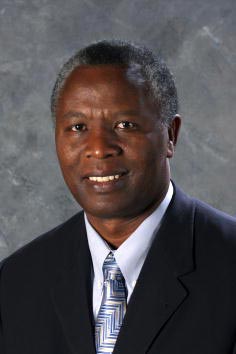
As the Rwandan genocide unfolded 15 years ago, Dr. Laurent Mbanda followed the fighting lines of the Rwandan Patriotic Front (RPF) to help administer aid to those who needed it most.
Mbanda is now Compassion’s Regional Vice President of the African region.
1. Where were you when the genocide started?
I was not in Rwanda. I arrived in May 1994 with Compassion to administer relief behind the RPF fighting lines. I was in Nairobi, Kenya, but before that I lived in the USA for 21 years. My parents left Rwanda, running for their lives, when I was 4.
2. How was Rwanda on the ground when you arrived?
Horrific! The country was on fire, it was in disarray, people were dying like flies; displaced people everywhere, bodies rotting everywhere. The military the RPF was trying to stop was visible. I could hear gunshots from where I was.
3. What were your impressions?
Horrible! Inhuman!
How could a human being do what the Hutu militia did to another human being? How could a government, a leadership of a country, turn against its people and butcher them?
I was angry. It was my people that were being butchered. I was scared for my life even as we went around administering relief where we could.
Initially, I was angry at some NGOs (nongovernment organizations). Many were coming in taking pictures and returning back to raise money. How could they have gone in empty-handed?
4. What did you do?
An American friend who was with me said that I was not grieving for my people! I had no time to grieve. I was on a mission to rescue and assist where I could. To feed children, nurse their wounds, and attend to the general needs of displaced people who were everywhere on the hills of Rwanda and the zones already rescued by the RPF.
5. What did you find the hardest?
Witnessing a country in disarray! It was hard to believe that a human being could have killed children, women, the elderly, their neighbors; people they had known and lived with, and in such a violent way. It was hard to believe the depth of hatred, the seed that had been sown, the divisions that went that deep.
6. How has the country changed?
Rwanda has had an amazing recovery and extraordinary progress since the genocide, on many fronts, but especially in the fight against poverty.
Rwanda’s economic growth rate of over 10 percent a year is an unbelievable success story. It has the highest number of female leaders of any parliament in the world. The country enjoys peace, security throughout and visionary leadership.
It is a story of success and model of good governance in the region. Reconciliation is taking hold, the country and people are turning to the Lord. Rwanda is a country committed to “never again” genocide in Rwanda.
7. What did Compassion do when it first arrived?
Compassion sponsored children to go to school, provided them with spiritual teaching, cared for their physical health, and taught them different skills for social development. The continued focus was on the individual development of children.
8. And straight after the genocide?
Compassion committed to contributing to the rebuilding of a then devastated society.
Currently, we are focusing on programs that contribute to the development of the country, meeting the Millennium Development Goals, and reducing poverty in the country.
Over 50,000 children and their families are benefiting from our program. Their well being, educational provisions, spiritual nurture and economical needs, among other things, are being met.
9. How do the government and the Rwandan people view ministries like Compassion?
They are thankful because they are committed to the development of Rwanda and its people.
The government’s desire is to see that aid is spent in a way that has maximum impact on economic development and poverty reduction. Agencies are encouraged to provide aid in line with national priorities. There is promotion of local ownership of development activities. The “handout” approach is not encouraged here.
When the genocide ended, Dr. Mbanda penned the book, Committed to Conflict: The Destruction of the Church in Rwanda, which discussed the church’s horrific involvement.
10. Your book is controversial. Why did you write it?
To tell the story about the role of the church in the conflicts that led to the genocide and the difference the church could have made. It questions the depth of teaching and discipleship of believers.
11. What do you say after all you have seen?
God continues to be in control and that He loves Rwanda and Rwandans. The heart of man is sick and needs a savior. The international community should never be put to shame again like it was during the Rwandan genocide. We cannot afford another genocide anywhere in the world. The international community needs to be watchful and must intervene in time whenever it is needed.
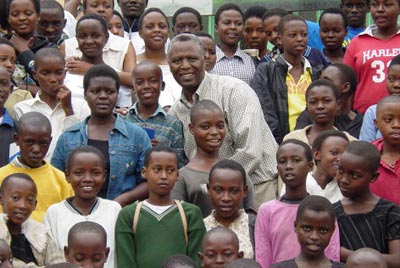
12. What is your dream for Rwanda?
To be a peaceful country, a prosperous witness of God’s grace and forgiveness, an example of what can happen with good leadership, a nation of purpose and unity among all Rwandans.
This post was written by Choe Brereton- Communications Specialist, Compassion Australia and Sara Martin, Contributing Writer, Global Ministry Center

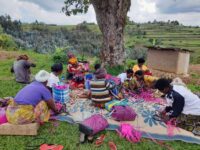
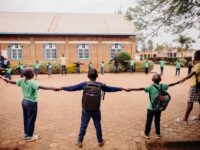
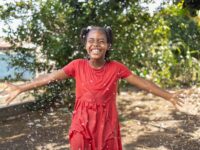
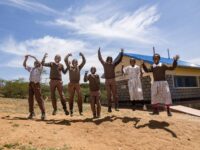


6 Comments |Add a comment
Praise the Lord! I went to seminary with Dr. Mbanda over 20 years ago! I am so grateful for his work and these comments are encouraging.
Great interview…thanks for sharing it with us.
Thank you so much for this outstanding interview. I have met Dr. Mbanda and have heard him speak, and have so much respect for him. I have also heard about Compassion children from both sides of the conflict sitting side by side in the projects now; there is healing and forgiveness in God’s Kingdom!
Thanks for sharing!!! What a great line “the heart of man is sick and needs a Savior!!!” Just like if my leg is broken I cannot run, likewise if my heart is sick there are many things I am void of as well.
Romans 5:8 “But God demonstrates His own love for us in this while we were still sinners Christ died for us!!!”
It’s so amazing that even after a horrible tragedy, Rwanda is starting to rebuild herself.
I want to to Rwanda someday. Not only do I sponsor a boy there, but I feel that the least I can do for the victims of the genocide is to travel there and pay my respects.
God is in control! Amen!